by Melkamu Derseh, International Livestock Research Institute (ILRI)
Abate Wale is one of the early adopters of irrigated fodder production practices promoted by the USAID supported Feed the Future Innovation Lab for Small Scale Irrigation in the Robit Bata Kebele of Bahir Dar Zuria district. Like any other farmer in the mixed farming system, Abate’s livelihood depends on crop production and livestock rearing. His engagement in small scale irrigation and improved livestock production has helped him to diversify his income. “I am now in a better position to lead my family than few years back,” he says.
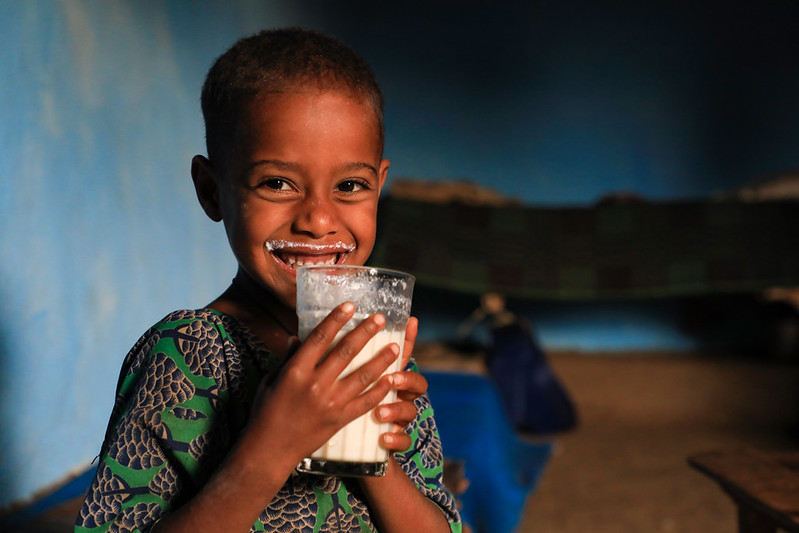
(Photo credit: Apollo Habtamu/ILRI)
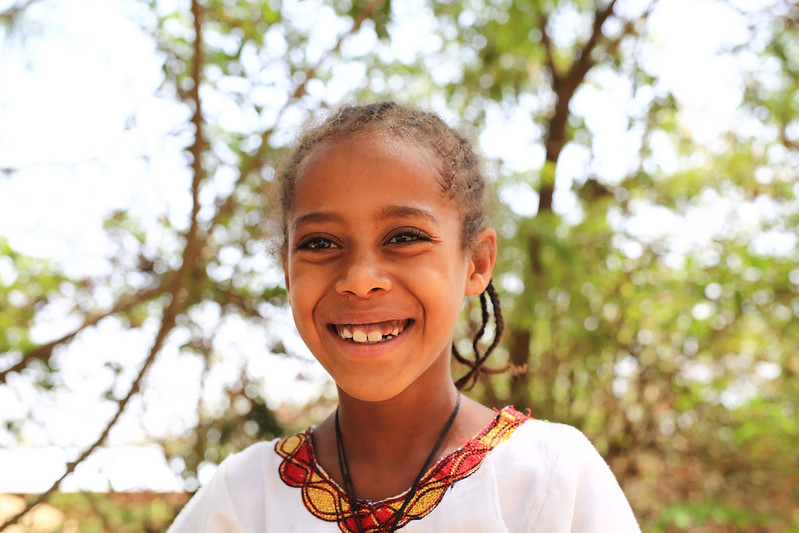
Change in family nutrition
Abate has five children, all of whom are attending school in their locality. Senait was a little girl four years ago (Fig 1, left) when a documentary of early adopters of irrigated fodder was produced (https://www.ilri.org/news/irrigated-forages-improve-livestock-productivity-and-livelihoods-ethiopia). Now, well grown and with a smiling face (Fig 1, right), she said that the family has more cows now than before. “My mother gives me milk every day, before and after school. I am now in grade 2 and am happy with my school time,” she said. The way Abate’s children are growing and sent to school are testimonies to an improved life for his family.
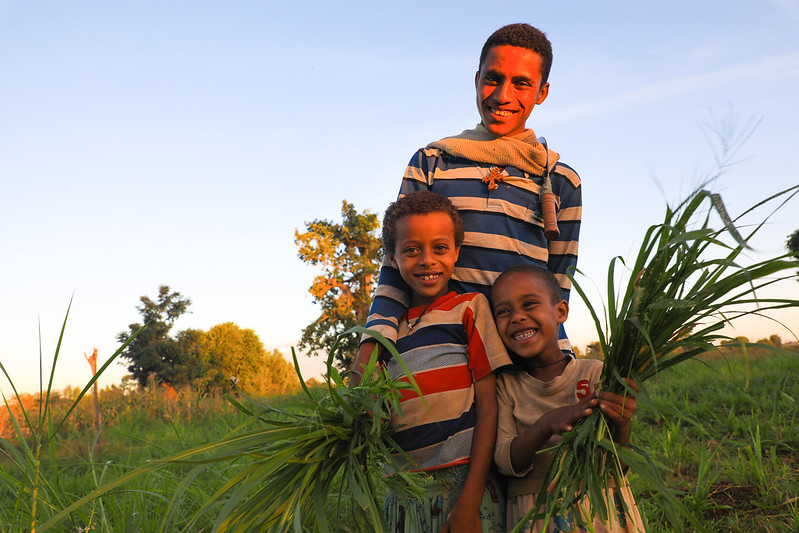
Increased feed biomass and quality of feed
Abate recalls his first experience several years back, “When researchers from the International Livestock Research Institute and Andassa Research Center approached us and explained the benefits of growing fodder for livestock using supplemental irrigation, many of us were skeptical of the benefits, but I decided to try it on a small plot.” He added, “After I tried it, I was surprised to harvest fodder every 4 weeks and get good quality feed from a small plot. As a result, my interest to expand my fodder plot has increased.”

Change of attitude
When the ILSSI project started experimenting with irrigated fodder in the Robit kebele, farmers in the kebele had no prior experience cultivating fodder and only just over a dozen (15-17) farmers were willing to collaborate with researchers and allocate a small plot (100m2) for the trial, Abate being one of them. Through a series of on-farm trials and demonstrations, however, the awareness and interest of farmers has increased considerably. Nowadays, close to 300 farmers are producing irrigated fodder on a range of farmland sizes in that village. The demand increases every year and researchers are working with development partners to reach more farmers.
Abate is also one of the farmers who replaced part of the Khat plant [stimulant] in his farmland with irrigated fodder to be able to produce enough feed for his lactating cows.
Currently, he allocates a total of 1250m2 of land (9% of his total land holding) for irrigated fodder production. Compared to Khat production, Abate explains that irrigated fodder is less labor and [agri-chemical] input demanding, and he is happy with the new practice.
Diversified income options
He said, “My income from the sale of milk increased considerably after I started using irrigated fodder to feed my lactating cows, and milk available for my children also doubled.” Prior to the intervention, he had only local cows. Over time, he acquired a crossbred cow – which produce more milk than local breeds – through Andassa Research Center. Now he has two crossbred lactating cows and plans to increase that number in the future.
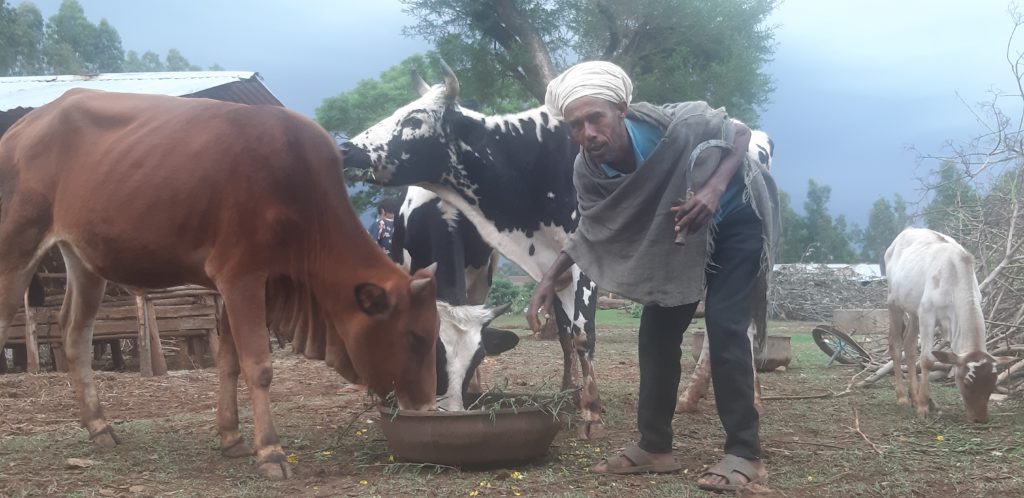
Formation of a dairy cooperative
“The presence of a functioning dairy cooperative on our doorstep encourages me to engage more in irrigated fodder and dairying,” he said, referring to the new milk collection and processing facility built by the Genet Lerobit farmer dairy cooperative through ILSSI project support.
The first attempt at a cooperative, which was formed before the ILSSI project’s intervention, collapsed as members could not supply sufficient milk for the market due to low volume of milk production because of the feed shortage. However, after the intervention of irrigated forages project, the cooperative was revived.
Market challenges
The successes are, however, not without challenges. Abate says a reliable market for milk remains a constraint for the farmers in the village. “Through our cooperative, we supply milk to collectors and processors. However, the milk collectors and processors sometimes do not respect the contract agreement they entered with us and hold back our money for a long time. We are still hopeful the cooperative would be in a better position to bring our dairy products to the market,” he said.
Explaining this issue, the chairman of the dairy cooperative said that the contract agreement they entered with milk processors was on a post-paid basis. That means they supply milk daily to the processor and payment is made at the end of the month based on the amount of milk supplied. However, recently one processor owed the cooperative more than six hundred thousand birr (approx. USD 12,000), but failed to pay them for more than five months.
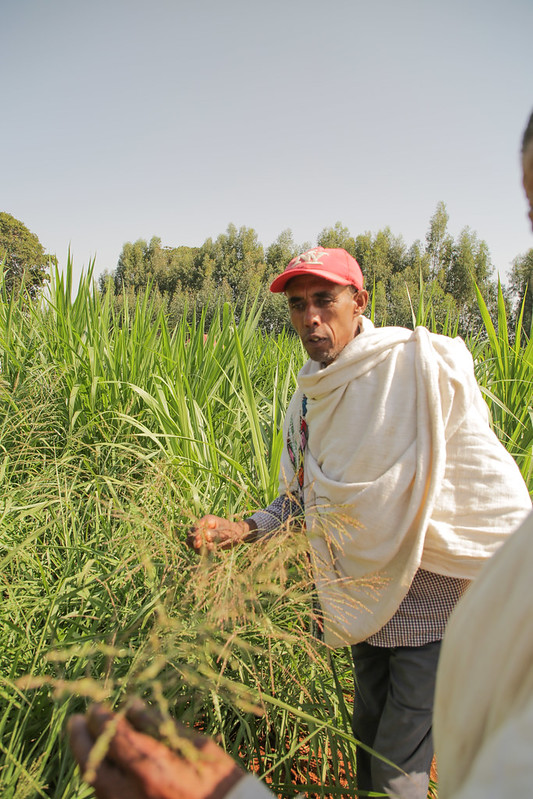

Alternative ways to mitigate challenges
The chairman noted that despite such challenges, members including Abate continue to bring their milk to the cooperative and currently it supplies about 500 liters of milk daily to the local market. “The cooperative is now embarking on processing milk into shelf stable products (butter and cheese) in the newly built facility with the financial and technical support of the Innovation Lab, and we hope this will solve some of the market problems we face at the moment,” he said. They also count on the support and commitment of district and zonal level experts and decision makers to further increase their dairy production in the locality. Consumption of nutrient-dense dairy foods is widely understood to improve child nutrition and health.

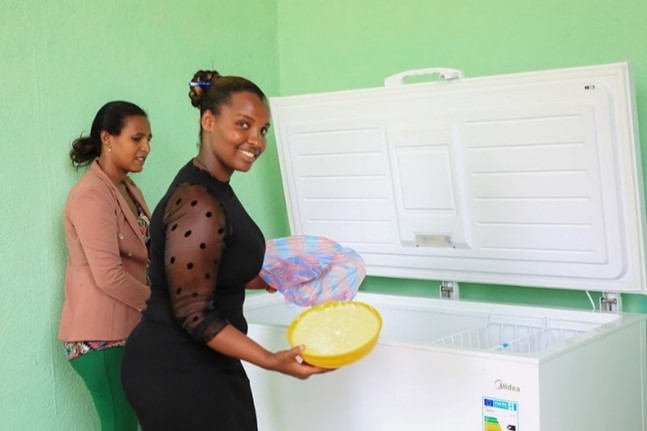
Lessons
Small scale irrigated forages production can change livelihoods if supported by research products like improved forage varieties, irrigation technologies, and follow up assistance from public sector and local stakeholders. Moreover, attention to fodder to dairy value chain elements and working with partners to address each element is crucial to sustain the benefits. To decide which technology to adopt, farmers need to see for themselves what works for them. In this respect, the participatory research approach that the ILSSI project followed in the project sites serves as a platform for scaling up lessons.


